SDG 7 – Indicator 7.2.1 Energy-efficient renovation and building
Peresmian The Gade Creative Lounge: Langkah Unsri Menuju Renovasi Ramah Energi
With assistance from Pegadaian Wilayah III Palembang, Universitas Sriwijaya (Unsri) has opened The Gade Creative Lounge at the Indralaya Campus Library. The lounge was created as part of a collaborative agreement that prioritizes sustainable and energy-efficient practices with the goal of improving student learning and creativity. The Gade Creative Lounge complies with Universitas Sriwijaya’s policy to guarantee that new construction projects promote energy conservation and offer teachers and students environmentally conscious environments by incorporating energy-efficient upgrades into the design. A dedication to lowering energy usage in academic institutions was demonstrated by the renovation’s inclusion of upgrades in line with energy-saving guidelines.
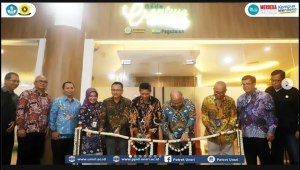
Prof. Dr. Ir. M. Said, M.Sc., Vice Rector for Planning and Cooperation at Unsri, thanked PT Pegadaian for their ongoing assistance in advancing high-quality education through sustainable infrastructure during the launch event. The collaboration supports Unsri’s overarching goals for energy-efficient campus renovation projects and is a crucial step in creating an academic atmosphere where sustainability and efficiency are valued. Furthermore, by giving ten exceptional kids educational aid, Pegadaian increased the lounge’s social impact by creating an environment that encourages academic success and is also environmentally conscious.
Link:
SDG 7 – Indicator 7.2.2 Upgrade Buildings to Higher Energy Efficiency
FISIP UNSRI Builds a New Building for the National Campus with Energy Efficiency Standards
At the Bukit Besar Campus in Palembang, Sriwijaya University (Unsri) will build a new eight-story structure through the Faculty of Social and Political Sciences (FISIP). In keeping with Unsri’s mission as a National Campus, this development attempts to provide FISIP students with a cozy and contemporary learning environment. It is anticipated that the new structure would house amenities that promote excellent instruction and learning and act as a symbol of Unsri’s dedication to raising educational standards and creating a supportive learning environment.
The building is built to meet space and comfort requirements while also lowering power use by adhering to energy efficiency regulations. In order to lessen reliance on artificial air cooling, this endeavor includes plans to install energy-saving equipment and spatial patterns that take natural air circulation into account. Through this program, FISIP Unsri shows its dedication to environmental sustainability through energy-efficient development in addition to improving physical facilities.
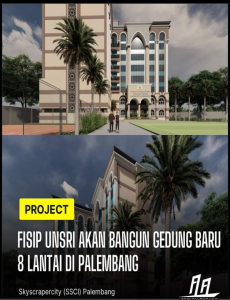
Link:
SDG 7 – Indicator 7.2.3 Carbon reduction and emission reduction process
Sriwijaya University Chancellor Receives Audience from Sriwijaya Eco Team Discussing Energy Saving Cars and Electric Motorbikes
The Sriwijaya Eco Team held an audience with Sriwijaya University (Unsri) to discuss Energy Saving Cars and Electric Motorbikes. The team consisting of 20 students headed by Rizki Fadilah together with the Sriwijaya Eco Team Supervisor Lecturer Gunawan, S.T. M.T. Ph.D. This was received directly by the Chancellor of Unsri, Prof. Dr. Ir. H. Anis Saggaff, MSCE. IPU. MKU. ASEAN Eng.
The Sriwijaya Eco team explained their future plans to develop products from the event being held. The main focus of the Sriwijaya Eco Team is to conduct research on electric motorbikes that not only have superior performance but also attractive aesthetics and provide comfort to their users. In the initial stage, the team’s commercial target was to submit an offer to the Unsri Campus staff to purchase the products they would produce. The development of energy-efficient cars and electric motorbikes will continue until 2024 and continues today
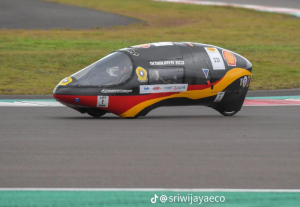
Link:
SDG 7 – Indicator 7.2.4 Plan to reduce energy consumption
Sriwijaya University Showcases Energy Efficiency Innovations at Merdeka Belajar Month Exhibition
Sriwijaya University showed its commitment to sustainable development and energy efficiency by showcasing innovative student inventions during the Merdeka Belajar Month exhibition, which was held at the Balaputra Dewa Museum in Palembang from May 31 to June 2, 2024. The Sriwijaya Eco Team’s work, which included an energy-efficient electric motorcycle and a fuel-efficient car, placed in the top 10 of the 2023 Shell Eco-Marathon Asia-Pacific and the Middle East. These programs demonstrate Sriwijaya University’s dedication to reducing energy consumption and position the university as a leader in energy-conscious innovation by encouraging research and development in sustainable technology.
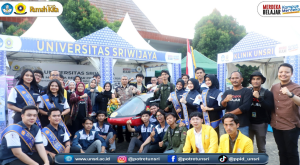
The university’s overarching goal of promoting a sustainable future via instruction and the real-world implementation of energy-saving measures is in line with this display. The accomplishments of the Sriwijaya Eco Team show the school’s dedication to energy efficiency as well as its involvement in educating students to develop eco-friendly technology that can lower overall energy consumption. Sriwijaya University is encouraging an energy-efficient attitude through these programs, supporting national and international activities to lower energy use in the face of environmental issues.
Link:
SDG 7 – Indicator 7.2.5 Energy wastage identification
Analysis of Energy Conservation and Efficiency in the Tower of the Faculty of Law, Sriwijaya University Based on Indonesian Green Building Certification
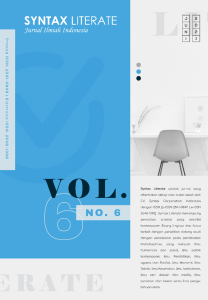
Link:
SDG 7 – Indicator 7.2.6 Divestment policy
Ngobrol Bareng Seputar Society of Renewable Energy
In partnership with scholars from Sriwijaya University’s Faculty of Economics, Wahana Lingkungan Hidup Indonesia (WALHI) South Sumatra has drawn attention to the long-term societal unviability of coal-based energy sectors. Based on studies carried out in the Tanjung Agung District of Muara Enim Regency, this assessment highlights the detrimental impacts of large-scale coal mining operations on the social and economic facets of local life. The results show that the marginal social benefits of mining operations, such as increased land prices, employment opportunities, and corporate social responsibility initiatives, are outweighed by the marginal social costs, which include decreased agricultural productivity, environmental pollution, and pressures to adapt to a changing livelihood.
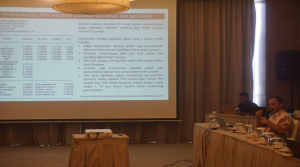
The research team emphasizes that switching from fossil fuels to renewable energy will better support social and environmental sustainability in South Sumatra in light of these effects. Additionally, WALHI offers suggestions to local governments on how to improve monitoring of the environmental effects of coal mines and adjacent power plants, as well as how to assist community capacity building for non-coal-based economic activity. In order to make sure that environmental management produces more social, economic, and ecological advantages than the social costs sustained by impacted communities, WALHI requests that the national government reevaluate new mining permits.
Link:
